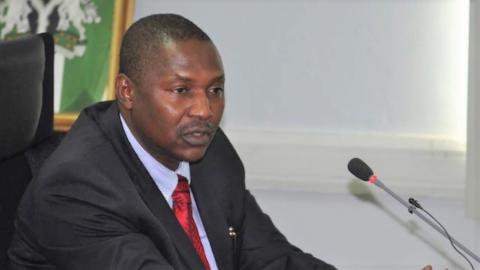
The organisation alleged that Malami had not prosecuted any corruption case in about five years he had been in office but had watered down cases that the Economic and Financial Crimes Commission was investigating or that were before the court.

Transparency International, the world’s foremost coalition against corruption, has said that Nigeria’s Attorney-General and Minister of Justice, Mr Abubakar Malami (SAN), frustrated high-profiled cases since he assumed office in 2015 and has not been at the forefront of anti-corruption fight.
The organisation alleged that Malami had not prosecuted any corruption case in about five years he had been in office but had watered down cases that the Economic and Financial Crimes Commission was investigating or that were before the court.
TI’s representative in Nigeria, Mr Auwal Musa Rafsanjani, made the allegation in an interview with THISDAY while defending the 2019 Corruption Perception Index of the organisation, which measured corruption in 180 countries and territories.
The CPI, which the Civil Society Legislative Advocacy Centre, TI’s chapter in Nigeria, released on Thursday, revealed that Nigeria scored 26 out of 100 points in the 2019 CPI, falling back by one point when compared with the 2018 report.
In the country comparison, the CPI revealed that Nigeria “ranks 146 out of 180 countries – two places down compared to 2018 results. While the index does not show real incidences of corruption, it is a reliable indication of the perception of the Nigerian public and the international community about the state of corruption in the country.”
Disappointed at Nigeria’s rating on TI’s corruption index, Malami condemned the 2019 CPI that placed the country at 146 out of the 180 countries and territories globally, noting that there was no evidence to back the country’s rating.
In a statement by its acting spokesperson, Mr Tony Orilade, on Friday, the EFCC faulted Nigeria’s poor rating on the index, questioning the bogus and ambiguous criteria TI used to arrive at what it called “a jaundiced and illogical rating.”
But in a conversation with THISDAY, Rafsanjani challenged Malami to present one corruption case he had prosecuted since he assumed office in 2015, noting that the AGF in four years had not prosecuted any corruption case.
Rather, TI’s contact person alleged that the AGF watered down corruption cases that the EFCC had been investigating before Malami assumed office or the graft cases that had been filed at the court before he took over as the justice minister.
Citing different corruption cases the AGF allegedly frustrated, Rafsanjani explained how Malami prevailed on President Muhammadu Buhari to drop the Malabu oil scandal at the initial stage.
He said, “Malami misled the President that there was no case in the Malabu oil deal contrary to the position of the EFCC. That is why the case did not go on for a very long time. Until the EFCC insisted on prosecuting the case, the Malabu oil scandal has been swept under the carpet.”
He also explained how the AGF withdrew the corruption case against former Gombe State governor and a chieftain of All Progressives Congress, Danjuma Goje in 2019 after Goje stepped down to context the election of the President of the Senate.
He alleged that the AGF “applied for the withdrawal of the charges even though EFCC had filed N25bn corruption charges against Goje alongside a former Executive Chairman of Gombe State Universal Basic Education Board, Mr. Aliyu El-Nafaty.”
Rafsanjani, also, explained how Malami stopped the prosecution of former Senate President, Dr Bukola Saraki for allegedly forging the Senate rules to conduct the election of principal officers.
Since 2015 the attorney general had been in office, Rafsanjani claimed that he “has not gone to court to prosecute any corruption case. Rather, he has watered down corruption charges in courts or those under investigation at the EFCC.
“Rather than dismissing the TI’s corruption index, the federal government should review areas where we need to improve on the efforts of fighting corruption,” TI’s representative advised.
He, therefore, justified the corruption perception index on Nigeria, noting that it “is the perception of citizens in Nigeria. This has nothing to do with what EFCC or ICPC is doing.”
In Nigeria, Rafsanjani lamented that public offices “are abused and electoral processes at all level compromised. When they go to hospital, they encounter corruption. When they go to police either on the road or at the police station, they encounter corruption.
“When students are seeking placements in the tertiary institutions nationwide, they encounter corruption. When they go to process international passport or driver’s licence, they encounter corruption. This has nothing to do with what EFCC or ICPC is doing.”
Rafsanjani lamented that the critics of the 2019 CPI did not read the report, noting that in the same index, specifically, the ratings of Canada and the US dropped.
He therefore challenged critics of the 2019 CPI to come out and present facts that contradict the Corruption Perception Index on Nigeria.
He said, “In fact, government does not need Transparency International to know there is corruption in Nigeria.
“It is something that is happening on daily basis. If they are saying there is no corruption, let them come out and contradict the CPI with facts and figures. Any official that dismisses the CPI is actually the beneficiary of corruption. It is the perception of citizens in Nigeria.”